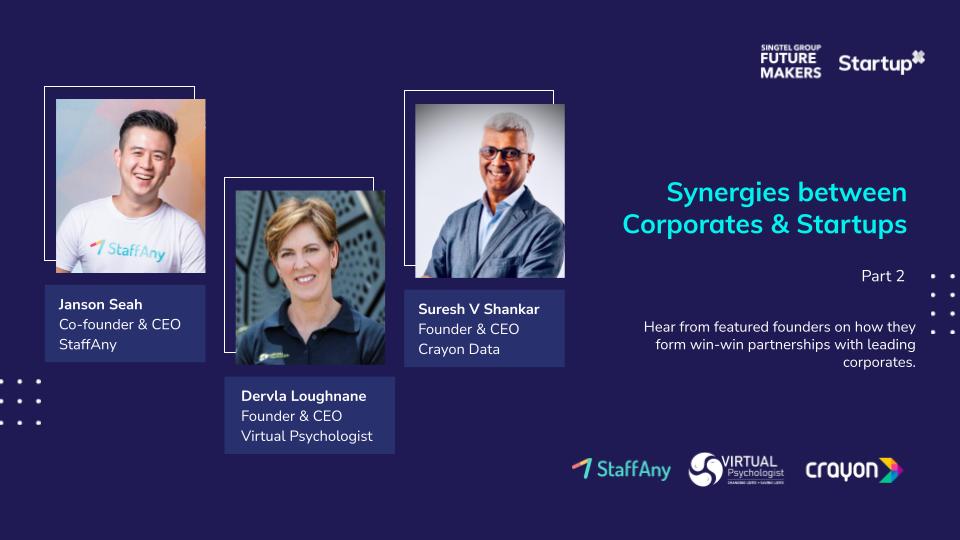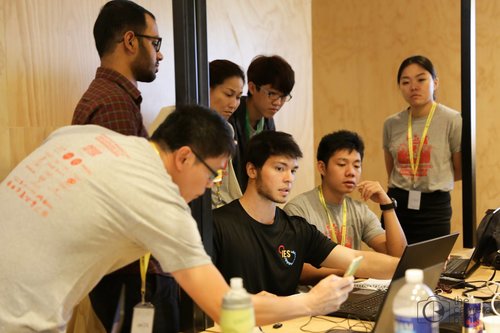Insights from Singtel Future Makers
In 2021, StartupX partnered with the Singtel Future Makers team to host a panel discussion with three prominent founders working across various industries to share about the ins and outs of developing corporate-startup partnership.
Janson Seah (StaffAny), Dervla Loughnane (Virtual Psychologist) and Suresh V Shankar (Crayon Data) break down some of the biggest challenges they personally faced and share interesting advice to founders who are on the same journey.
This is part two of the full session. Go here for part one.
 *Editor’s note: The following has been edited for clarity.
*Editor’s note: The following has been edited for clarity.
Overcoming Challenges
Shih Han: Dervla, are there any challenges that you face when you’re partnering or piloting with the corporate partners, besides the features that some of the partners request for? And how do you actually overcome these challenges?
Dervla: When you partner with certain organisations, you do tend to lose some control. There’s always that sort of bartering of what you prepared to give up, but many benefits too. We’ve certainly found that virtual psychologists we partner sometimes don’t allow us to do marketing or advertising of our service.
And now when you’re looking at mental health, we can’t actually contribute to that marketing or advertising. Not only messages may come out wrong, but also our bottom line, where we’re not promoting our servers. It’s all impacting our sales. So that’s probably one of the biggest problems we found with partners. When you are really trying to negotiate and it boils down to normally you’re told what the contract looks like. But as you get a little bit bigger, and you get a little bit more credibility behind you, you can start negotiating with the partnerships and actually start to discuss shared marketing strategy, how you will co-brand together and so on.
So like all startups in the beginning, if you make silly mistakes, you agree to everything. As you go along, you learn from your mistakes, and you learn to sort of maybe put your needs first.
Shih Han: Right, okay. So I think the Dervla has also mentioned that one challenge that they face is that it actually takes up a lot of bandwidth to nurture the relationship with partners. And I think Suresh has recommended measuring the attraction and the outcome. Suresh, do you want to elaborate on that?
Suresh: I think one of the things is when I say measure, traction and output, when you want to go to a partner, you want to say, listen, you’re going to get me so many customers and you’re gonna get you so much revenue, that’s the outcome. Outcomes take time to achieve right, especially in a partner motion where you’re one step behind the partner. But I think far too often in a startup, obviously, the outcome is the most important thing we think, because you know, all in for us, it’s existential, if you’re a startup, I need that revenue, I need the client, I need something to get signed. For a partner. It’s not existential right.
So a better way of trying to try and do this when you’re investing time and effort is, are you making traction? Have you gone in front of more clients? Have any other clients you know, somebody from the chasing to make sure the client is moving it from stage X to stage Y? Why do you know, a deal closure? are they putting out your let’s say, it’s a consumer business that you’re partnering with? are they putting out your message in front of more consumers?
Look at the traction matrix, because I feel from a partnership perspective, your partner typically has more control over the traction of the process than it is on delivering or guaranteeing the outcomes.
There is a third way which is the presence of a champion that you have inside the organisation. And I’ll talk about my own thing, the presence of a system inside the organisation. Now these are harder to measure, because these are field things, right? A champion will always tell you, because that’s right. That’s the reason you have a champion, the champion will always come back and tell you to listen, I think I’m making progress. And this is what is happening. And you don’t know about that, that informal feedback is sometimes the most important thing. The moment you have a champion, it may not be visible to you as traction, but something is happening and just don’t worry and be patient. And you don’t normally have that feedback mechanism because you’re sitting outside the corporate partner.
The second one is a system and for me this is a very useful thing. We work with a large company, we’ve had three partner managers in the last three years. The system has never let us down in the sense their system is that the Partner Manager will come and they will pick up the thread every year the jobs change.
So when you look at companies that have a very systemic process, the system will keep carrying you forward. And this is slightly harder to measure the presence of a system or presence of a champion. But I find that very indicative of long term success. No matter what they buy, you go back to your core question. If you choose to go this route, be prepared to invest time, if you don’t have time and bandwidth, don’t go down the partner route. Do what is more under your control if you have a shortage of time.
Shih Han: Janson, any challenges that you actually faced while working with partners and any tips for overcoming these challenges?
Janson: There’s definitely going to be a lot of challenges, like you know, the things that you have discussed about legality process and workflow. One of my biggest suggestions, actually, is to join accelerator programmes like those posted by StartupX. Most accelerator programmes are a shortcut to actually get champions and stakeholders to push your project agenda forward.
I’ll give an example. I’ve been to many corporate innovation projects and one of them is based in Thailand. For that programme, I was able to do a pilot with a restaurant chain in Thailand. Now, that pilot didn’t turn me to a full implementation because we didn’t have the features that were in the roadmap. However we still have a very good relationship with the stakeholders over there.
And to give another example, Singapore. It’s hot there, government boards as well as corporations are coming together to embrace innovation. So we also went for a programme that helped us connect with hotels, and we were able to run a pilot with one of the largest hotels. If we go through the entire sales process by ourselves it will be extremely difficult. But because now there’s an agenda on both parties to make that accelerator programme, partnership programme work, then it’s like a shortcut or push right. Now that again, wasn’t that fruitful at this point of time, because of COVID. But what I would like to share is taking advantage of such programmes, keep your eyes peeled, and also thank incubation managers and portfolio managers like Shih Han for helping bridge those gaps.
A Word of Advice
Shih Han: Thanks Janson! I think basically, it’s also trying to expand the network. What Janson says is also to expand your network. While you know, the partners that you’re talking to today might not be a direct customer right now. But growing that relationship, and, and working with them and building that relationship, nurturing it over the time, it would turn into something fruitful down the road.
So before we move on to the Q&A, maybe just a last question for all my panellists. What would be one piece of advice that you give yourself before working with a corporate partner? Dervla? Maybe we can hear from you first?
Dervla: Yes, I think Suresh said this. Learn to be patient, you might be passionate, you might think Rome was built in a day, you might think you have the best solution, but just be patient and don’t give up. Just keep going, don’t give up and you will get there. Some of our contracts took us over 12 months. And so patience is something that I wish someone had said to me right at the beginning. Great things take time.
Shih han: Right! Janson, what about you?
Janson: Actually I want to share something in the same vein. And I’ll just give you an example.
We revived a conversation that we started one and a half years ago but turned out to be a deal loss. At that point of time, they ghosted us halfway through because you don’t know what’s happening in the middle. I didn’t get a good champion and I didn’t follow what Suresh and Devla was talking about best practices on the partnerships programme, but we kept in touch through both our content marketing, nurturing our relationship and they came back to say “Hey you know we look about this and last time we had you know busy implementation of another solution, now we are ready to relook into it”. And these are like the RFQ kind of questions that they sought out internally and what they exactly were looking for. And then now we restart that conversation and have things moving again at full momentum.
So my recommendations to people in this room is that, you know, you know, deal loss at that point of time, doesn’t mean deal loss. Keep in touch, keep the pipeline and let everybody know your updates and keep that positive relationship, because at that point, we really don’t know what’s, you know, holding the deal.
Shih Han: Right. That’s a good tip there for everyone. So if you know a partner that you’ve spoken to for six months, 12 months, maybe reconnect, and see what’s happening, and maybe take that conversation forward from there. Suresh, any tips what would be one piece of advice that you will share?
Suresh: First is I think, to all the founders, the biggest challenge you will face in your company in growth is distribution. Partners offer distribution, and therefore you have to invest in it. You have to do it, because you will reach a stage in your company, where you will need that distribution network to be able to grow. You have to start early and say there’s a certain amount of bandwidth and time that I would put into it, because you will never achieve your distribution goals without a proper partnership strategy.
I think the second thing is don’t be afraid to ask your partner hard questions about the lack of traction or the lack of engagement. That honest conversation is actually better. One of the best conversations I had was a call from somebody and I said, you know, we’ve been talking to you guys, we are doing this, we keep turning up, we keep doing it and zippers happen. And that conversation actually changed the way the person who became the person said “What is your problem?”. I said “I don’t understand how you guys work”. And then the lady actually said “Okay, I’m not gonna take this upon myself”. She came back in two weeks and there is a problem. I’m going to go find out what is happening inside this etc.
So don’t be afraid to ask your partner manager or a senior leader. What is it that takes to make success when you don’t get traction inside that. So these would be the two big things or at least, I would recommend you to start early because distribution is key. Don’t be afraid to ask your partner manager hard questions on traction and outcomes.
Shih Han: Right, thanks! My next question is how do you manage to get the product from what you want to what it is today? And which product might be in the product pipeline and not available today? What are some of the thoughts on early pilots in serving and meeting the needs of your customers? Janson, any thoughts on this?
Janson: I think that the most important decision at the end of the day is to arrange the order of attack. When you work on pilot projects, people know that they want to know what you can do and your chance to know what they exactly are looking out for. So in our case, when we look at pilot projects on our ideal customer segments, we do have a very good conversion rate and confidence that we could definitely serve them. But when we talk about people that are a little bit off that ideal customer profile, we have honest conversations with our partners.
So I think relentless prioritisation, using Suresh’s framework is great. But now I think that my recommendation is don’t do everything and don’t build everything. The reason for that is because you need to really have that product vision and the strategic guidance because you are a small startup, you just don’t have the resources to customise for every single customer.
Shih Han: What about Suresh?
Suresh: I think perhaps I’m addressing a thing from my side where we are slightly later stage. So but I think you’re absolutely right, in the early stage, you don’t want to take on things that are distracting for you.
Shih Han: Dervla, how do you guys manage that?
Dervla:I think it is very much about managing expectations in the beginning and clearly defining what the KPI is going to do. But I would strongly recommend based on our experience that it is really over performing or over delivering when it comes to pilots. Any organisation that is working with you or is partnering with you is taking a big risk to be with you. It was really important to us that we constantly proved our success rate, and proved the relationship time and time again, whether that be through qualitative data or quantitative data or return on investment. So keep going back to the partnership and really giving them evidence as to show why it works.
Shih Han: Right. Okay, thanks for sharing. Before we move, this is just a personal question that I have from our founders here. We all know that for startup founders, when we approach partnerships, all the chances of success are actually pretty small. So how do you actually push your team and actually do better or like to actually navigate further and figure out what are the next steps? Suresh? Maybe I could get you to share that on this.
Suresh: There’s a famous thing that Elon Musk said that if you are looking for empathy, don’t do a startup. I’m often found saying that because one of the things is that it’s a hard grind and partnerships are no different from the other hard grinds that all startup founders go through. And I think we have to be prepared. And I don’t think anybody giving anybody who’s stepped out of whatever they’re doing, or following a dream, that this is gonna be a hard grind and. Be persistent and be patient. I mean, it’s part of our DNA as founders.
So I think most of the people out here are probably very well qualified to deal with disappointing partnerships. I think the only point is that when you’re dealing with a corporate partner, it’s frustrating only because somebody will give you a big promise and the actual delivery will be much slower. So it’s a different kind of frustration that happens. And you’re not in control either, right? At least when you’re talking to a client directly, you’re in control of something. But I would basically say that disappointment is part of an entrepreneur’s journey.
Shih Han: Right! What about Janson? Any experience you want to share with us.
Janson: Sometimes a lot about things like sales motions and business value opportunities are actually a numbers game. So you need to make sure that you have a good pipeline and learn from each of these experiences. Don’t grieve about your failures, but rather learn from them. How can we evolve and grow from there? Treat it positively and be thankful to the people that believe in you. Make sure to achieve those outcomes for those people that matter. Counting those winners matters a lot more to us.
Shih Han: All right. Thank you, Suresh, Duflot, and Janson for joining us today and sharing all the insights there.








